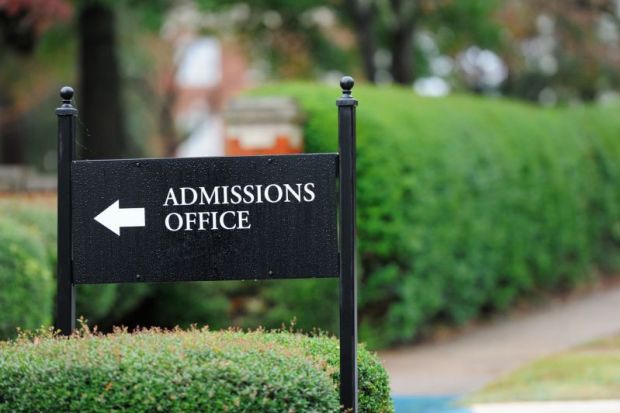With a flurry of statements from UCAS, the Department for Education and Ofqual telling anxious university applicants to keep calm, we can be sure that this year’s university admissions will be controversial.
The press certainly think something’s up with a matching flurry of articles predicting “clearing chaos” and such like. The Office for Students sits somewhere in between, urging applicants to “prepare for disappointment”.
Perhaps the biggest change this year is the flipping of the balance between demand/buyer (applicant) and supply/seller (HE provider). Pre-2012, when government funding and student number controls (in England at least) constrained supply at a time when regular if small amounts of grade inflation and rising populations of school leavers were still expanding demand for higher education, results day headlines were all about who didn’t get in and students, in the special vernacular of results days, “scrambling” for places.
But for the past seven years or so, the balance flipped in favour of the demand side – applicants with a decent hand of A-level grades could expect to get into their chosen universities, even if they had missed the terms of their offers by one or even several grades. Higher tariff universities were recruiting hundreds of students in Clearing. Universities were facing the dual pressures of falling school leaver populations, market forces unleashed by the removal of the student number control, and the Ofqual “comparable outcomes” policy keeping a lid on grade inflation. High tariff universities were growing at the expense of those further down the pecking order.
That the market balance changed for high tariff courses in 2020 (and 2021) was obscured by the pandemic era of centre- and teacher-assessed grades. Universities lost their usual levers to control recruitment because they had no means of predicting the grades that students would get and were hidebound by the offers they had made before it was clear just how much grades would go up.
So, while characterising 2022 as a more “normal” year is fair enough, it will still feel like a very new normal for most students and those who advise them on their university applications. A generation of sixth-form teachers have got used to students being mostly in the driving seat for university places; hence this year’s shock realisation that while there will still probably be places available for all, they won’t always be the places that students have set their hearts on.
As in the pre-2012 era, the most pressure will be on places at higher tariff courses and universities. These were courses that were forced into heavy over-recruitment in 2020 and 2021 when so many more students got the higher grades needed to confirm their place. This year, the offer rate for such courses has dropped, with universities making what Ucas chief executive Clare Marchant has called “precise, conservative and cautious” offers. Universities have taken the responsible position of using their offer-making strategy to ensure they don’t recruit too many students again. They’ve hedged against an unknown level of grade outcomes when the guidance on grades is less than clear at what Ofqual calls a midpoint between 2021 and 2019 grading.
While this should make for an orderly recruitment process for these selective courses, it will undoubtedly leave many applicants disappointed when their places are not confirmed with one or more missed grades. “It won’t be pain-free”, says Ucas. In earlier years, they would have got in – but maybe not so many this year. And that’s where the controversy lies. Simply that students and their teachers may feel unfairly treated because of the disruption of the pandemic, the perceived relatively easy ride for university applicants over the past two years and several previous years of benign conditions for university applicants.
There won’t be “clearing chaos” because the sector is packed full of professionals who know their jobs and will manage clearing demand in their usual calm and efficient manner. But there probably will be many applicants who will have to make the big decision to change their university or course choice if they want to go to university this year, and no doubt that’s what the headlines will be about – students “scrambling” for places, again.
Pressure from the regulators to level-up admissions for disadvantaged and minority groups will add more sense of grievance for higher income and private school applicants holding good A-level grades but unable to secure a place in a higher tariff or Russell Group course.
Which brings me to my final point: on Russell Group universities. It’s a poor reflection on the rest of the sector that they have let the Russell Group, a group of research-intensive universities of varying quality, get away with establishing a runaway “brand” that bears little relation to the realities of the student experience or the relative selectivity of the courses on offer. There is a wide choice of non-Russell Group universities and courses that offer a superb education and student experience and that have courses available in clearing for disappointed applicants. It’s a crying shame that some prospective students (and their parents) will feel a sense of failure for not making it on to a Russell Group course.
The Russell Group has successfully built up its questionable brand values over a couple of decades. Some of the other universities now need to work harder to remove the stigma of being non-Russell Group and burnish their own credentials. And if it will take two decades to get there, they’d better start now.
Mary Curnock Cook is a former chief executive of Ucas
Register to continue
Why register?
- Registration is free and only takes a moment
- Once registered, you can read 3 articles a month
- Sign up for our newsletter
Subscribe
Or subscribe for unlimited access to:
- Unlimited access to news, views, insights & reviews
- Digital editions
- Digital access to THE’s university and college rankings analysis
Already registered or a current subscriber? Login







